Entrepreneurship and Small Business: Traits, Skills, Motivation
VerifiedAdded on 2023/01/10
|9
|1025
|66
Report
AI Summary
This report delves into the multifaceted world of entrepreneurship, examining the core characteristics, traits, and essential skills that define successful entrepreneurs. It contrasts entrepreneurs with business managers, highlighting their differing roles and responsibilities. The report explores the significant impact of entrepreneurial personality on motivation and mindset, emphasizing the importance of independence, power, achievement, and wealth creation as key drivers. Furthermore, it provides insights into the various types of entrepreneurial ventures and their influence on the UK economy, concluding with a summary of the key findings and referencing relevant academic sources.

Entrepreneursh
ip and Small
Business
Management
ip and Small
Business
Management
Paraphrase This Document
Need a fresh take? Get an instant paraphrase of this document with our AI Paraphraser
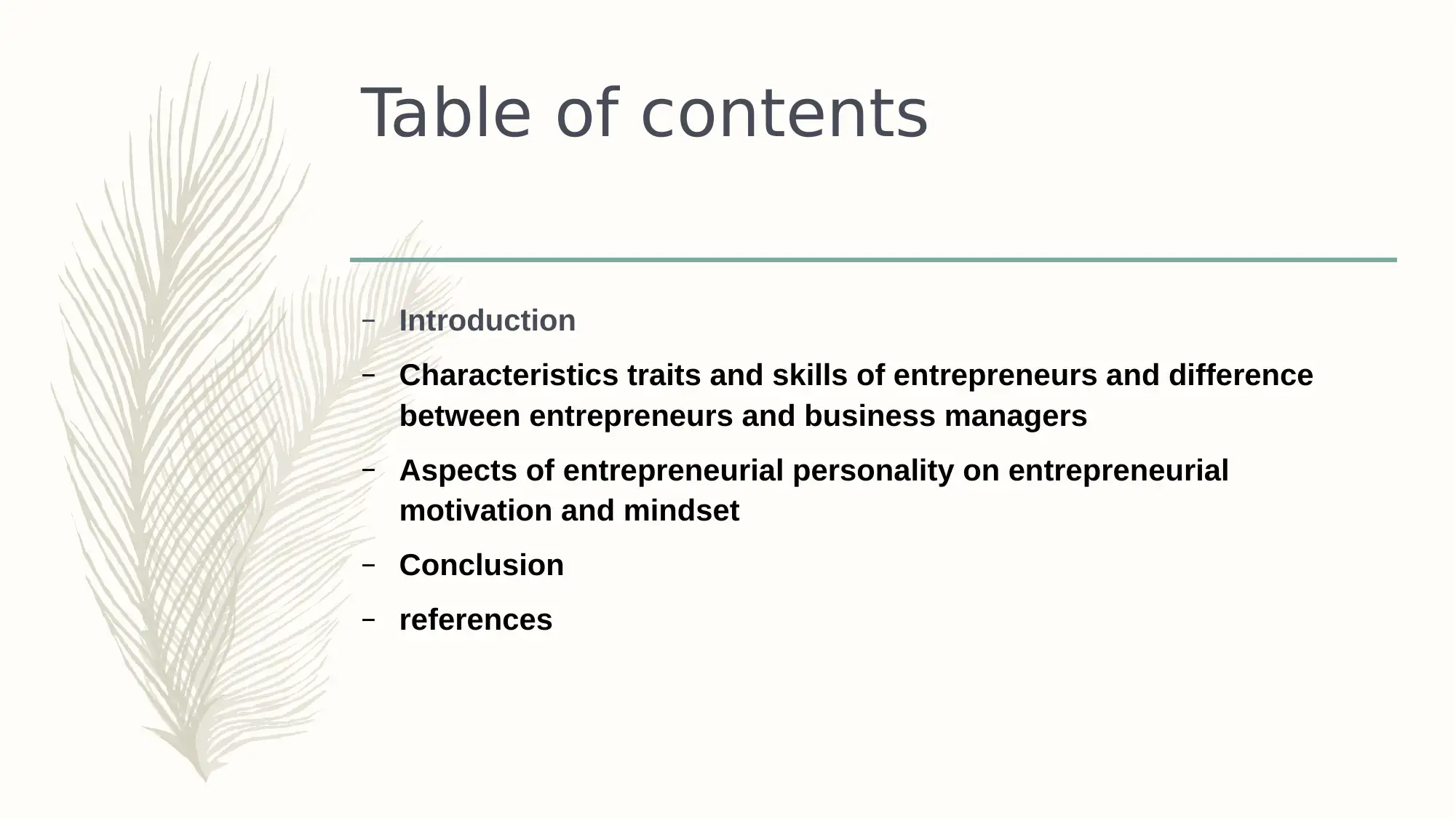
Table of contents
– Introduction
– Characteristics traits and skills of entrepreneurs and difference
between entrepreneurs and business managers
– Aspects of entrepreneurial personality on entrepreneurial
motivation and mindset
– Conclusion
– references
– Introduction
– Characteristics traits and skills of entrepreneurs and difference
between entrepreneurs and business managers
– Aspects of entrepreneurial personality on entrepreneurial
motivation and mindset
– Conclusion
– references
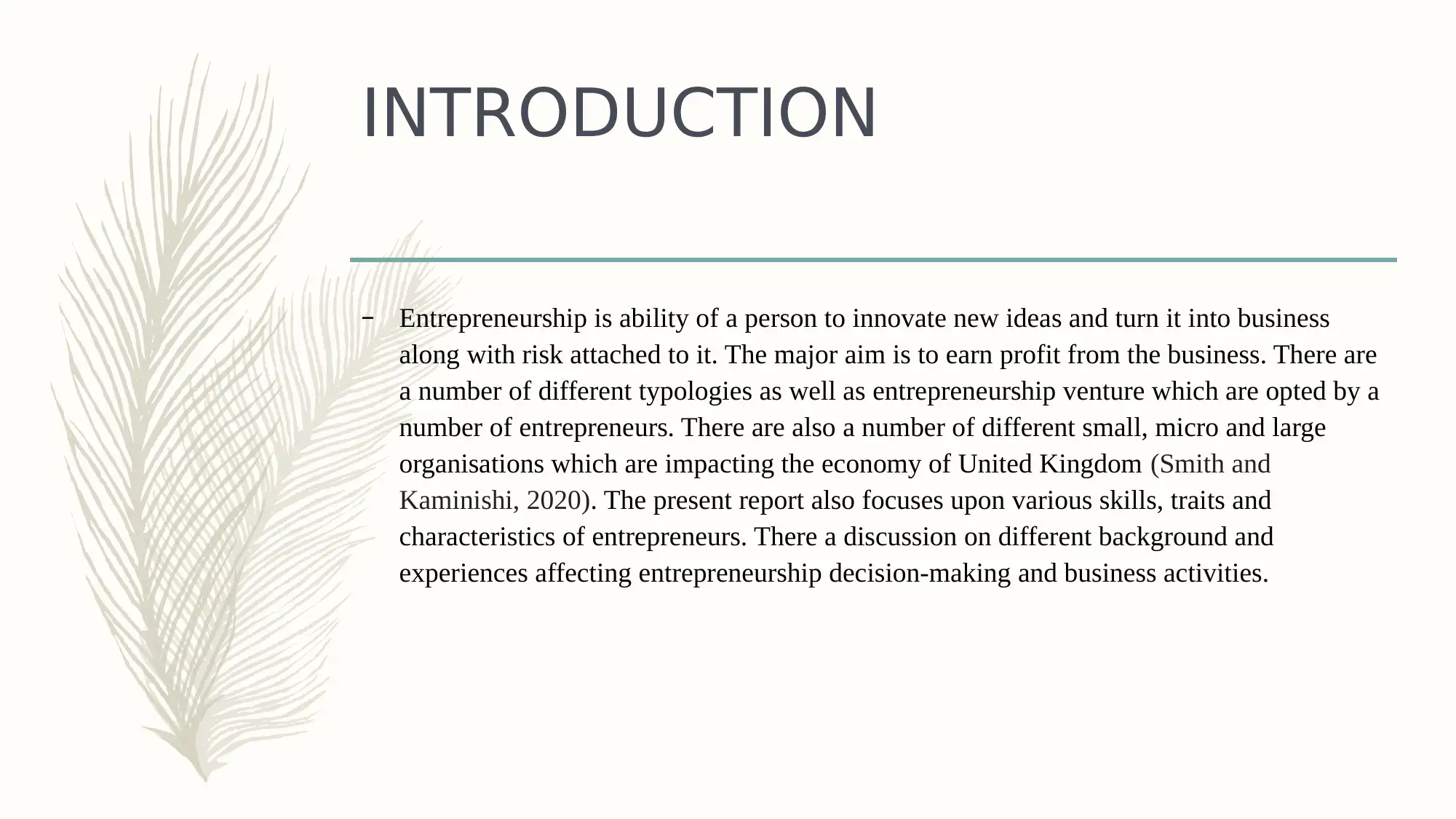
INTRODUCTION
– Entrepreneurship is ability of a person to innovate new ideas and turn it into business
along with risk attached to it. The major aim is to earn profit from the business. There are
a number of different typologies as well as entrepreneurship venture which are opted by a
number of entrepreneurs. There are also a number of different small, micro and large
organisations which are impacting the economy of United Kingdom (Smith and
Kaminishi, 2020). The present report also focuses upon various skills, traits and
characteristics of entrepreneurs. There a discussion on different background and
experiences affecting entrepreneurship decision-making and business activities.
– Entrepreneurship is ability of a person to innovate new ideas and turn it into business
along with risk attached to it. The major aim is to earn profit from the business. There are
a number of different typologies as well as entrepreneurship venture which are opted by a
number of entrepreneurs. There are also a number of different small, micro and large
organisations which are impacting the economy of United Kingdom (Smith and
Kaminishi, 2020). The present report also focuses upon various skills, traits and
characteristics of entrepreneurs. There a discussion on different background and
experiences affecting entrepreneurship decision-making and business activities.
⊘ This is a preview!⊘
Do you want full access?
Subscribe today to unlock all pages.

Trusted by 1+ million students worldwide
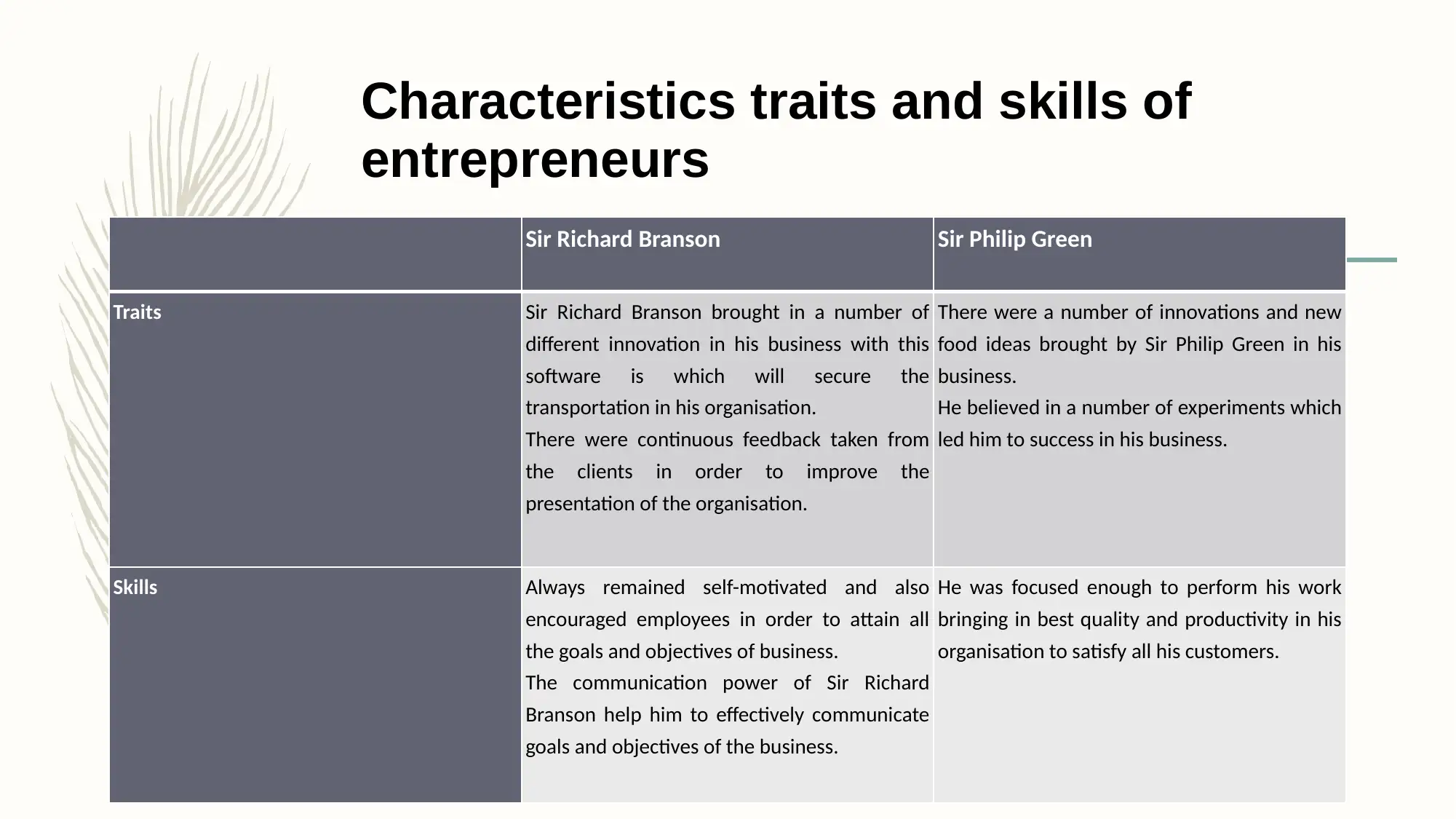
Characteristics traits and skills of
entrepreneurs
Sir Richard Branson Sir Philip Green
Traits Sir Richard Branson brought in a number of
different innovation in his business with this
software is which will secure the
transportation in his organisation.
There were continuous feedback taken from
the clients in order to improve the
presentation of the organisation.
There were a number of innovations and new
food ideas brought by Sir Philip Green in his
business.
He believed in a number of experiments which
led him to success in his business.
Skills Always remained self-motivated and also
encouraged employees in order to attain all
the goals and objectives of business.
The communication power of Sir Richard
Branson help him to effectively communicate
goals and objectives of the business.
He was focused enough to perform his work
bringing in best quality and productivity in his
organisation to satisfy all his customers.
entrepreneurs
Sir Richard Branson Sir Philip Green
Traits Sir Richard Branson brought in a number of
different innovation in his business with this
software is which will secure the
transportation in his organisation.
There were continuous feedback taken from
the clients in order to improve the
presentation of the organisation.
There were a number of innovations and new
food ideas brought by Sir Philip Green in his
business.
He believed in a number of experiments which
led him to success in his business.
Skills Always remained self-motivated and also
encouraged employees in order to attain all
the goals and objectives of business.
The communication power of Sir Richard
Branson help him to effectively communicate
goals and objectives of the business.
He was focused enough to perform his work
bringing in best quality and productivity in his
organisation to satisfy all his customers.
Paraphrase This Document
Need a fresh take? Get an instant paraphrase of this document with our AI Paraphraser
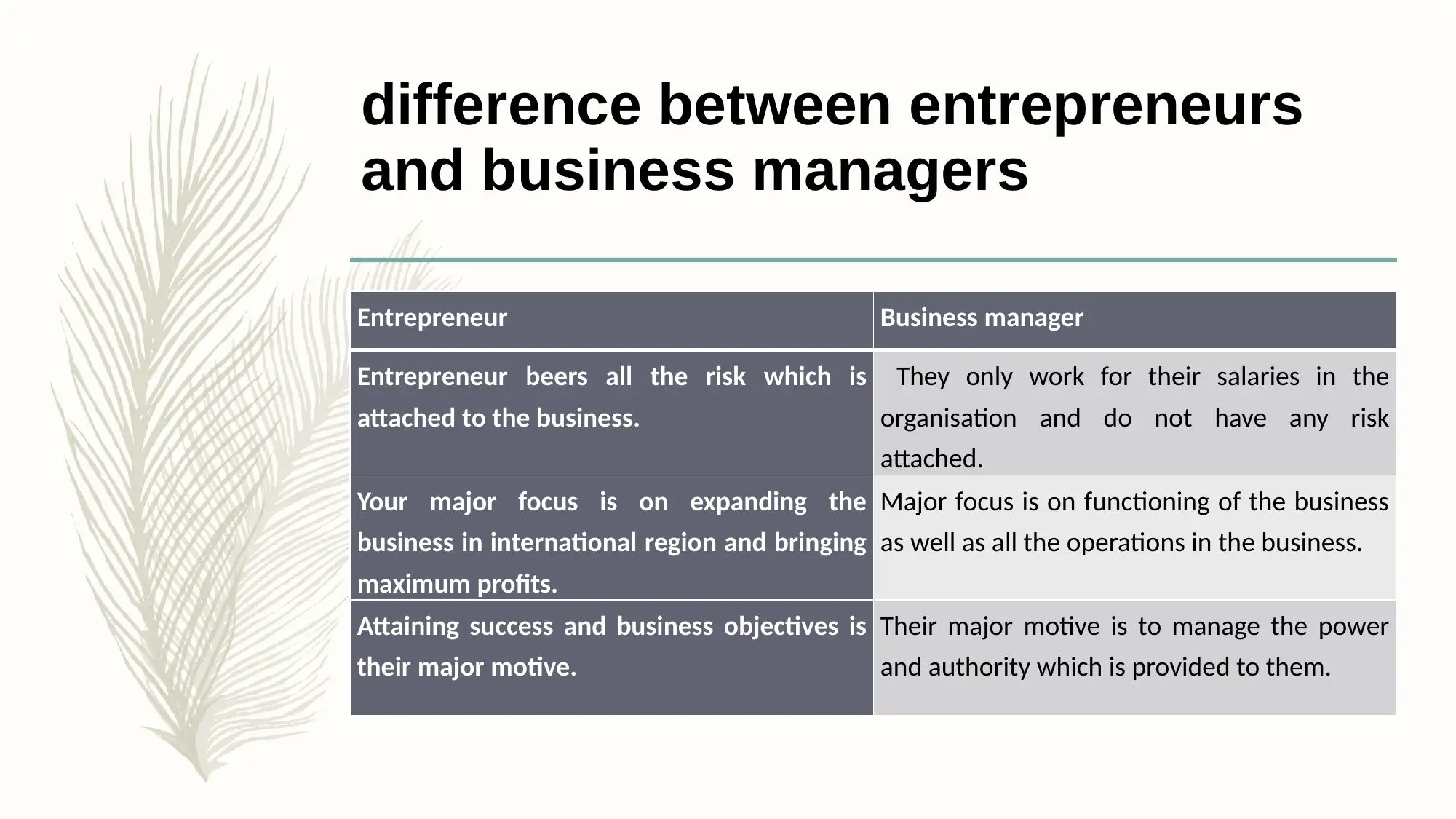
difference between entrepreneurs
and business managers
Entrepreneur Business manager
Entrepreneur beers all the risk which is
attached to the business.
They only work for their salaries in the
organisation and do not have any risk
attached.
Your major focus is on expanding the
business in international region and bringing
maximum profits.
Major focus is on functioning of the business
as well as all the operations in the business.
Attaining success and business objectives is
their major motive.
Their major motive is to manage the power
and authority which is provided to them.
and business managers
Entrepreneur Business manager
Entrepreneur beers all the risk which is
attached to the business.
They only work for their salaries in the
organisation and do not have any risk
attached.
Your major focus is on expanding the
business in international region and bringing
maximum profits.
Major focus is on functioning of the business
as well as all the operations in the business.
Attaining success and business objectives is
their major motive.
Their major motive is to manage the power
and authority which is provided to them.
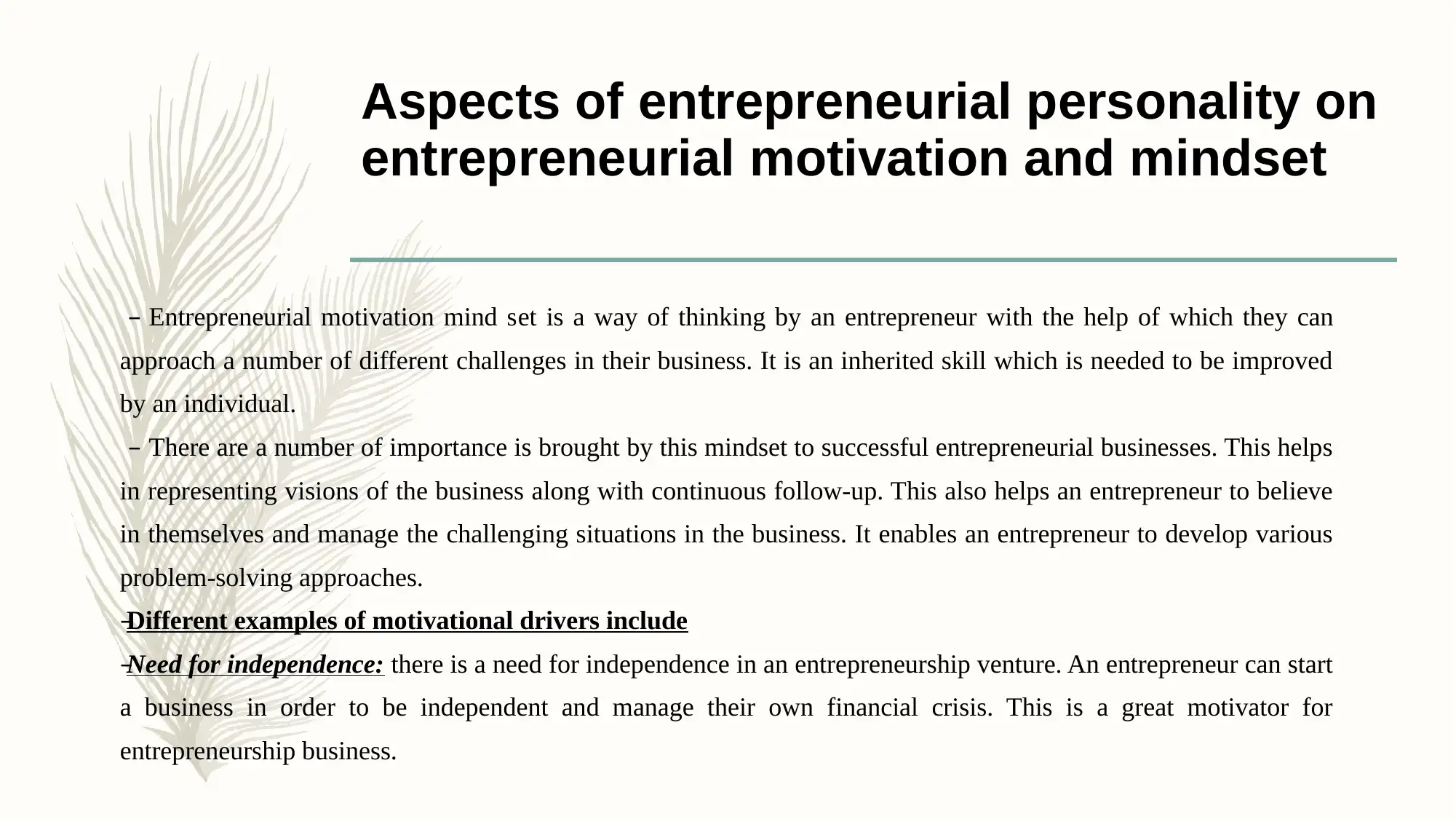
Aspects of entrepreneurial personality on
entrepreneurial motivation and mindset
– Entrepreneurial motivation mind set is a way of thinking by an entrepreneur with the help of which they can
approach a number of different challenges in their business. It is an inherited skill which is needed to be improved
by an individual.
– There are a number of importance is brought by this mindset to successful entrepreneurial businesses. This helps
in representing visions of the business along with continuous follow-up. This also helps an entrepreneur to believe
in themselves and manage the challenging situations in the business. It enables an entrepreneur to develop various
problem-solving approaches.
–Different examples of motivational drivers include
–Need for independence: there is a need for independence in an entrepreneurship venture. An entrepreneur can start
a business in order to be independent and manage their own financial crisis. This is a great motivator for
entrepreneurship business.
entrepreneurial motivation and mindset
– Entrepreneurial motivation mind set is a way of thinking by an entrepreneur with the help of which they can
approach a number of different challenges in their business. It is an inherited skill which is needed to be improved
by an individual.
– There are a number of importance is brought by this mindset to successful entrepreneurial businesses. This helps
in representing visions of the business along with continuous follow-up. This also helps an entrepreneur to believe
in themselves and manage the challenging situations in the business. It enables an entrepreneur to develop various
problem-solving approaches.
–Different examples of motivational drivers include
–Need for independence: there is a need for independence in an entrepreneurship venture. An entrepreneur can start
a business in order to be independent and manage their own financial crisis. This is a great motivator for
entrepreneurship business.
⊘ This is a preview!⊘
Do you want full access?
Subscribe today to unlock all pages.

Trusted by 1+ million students worldwide
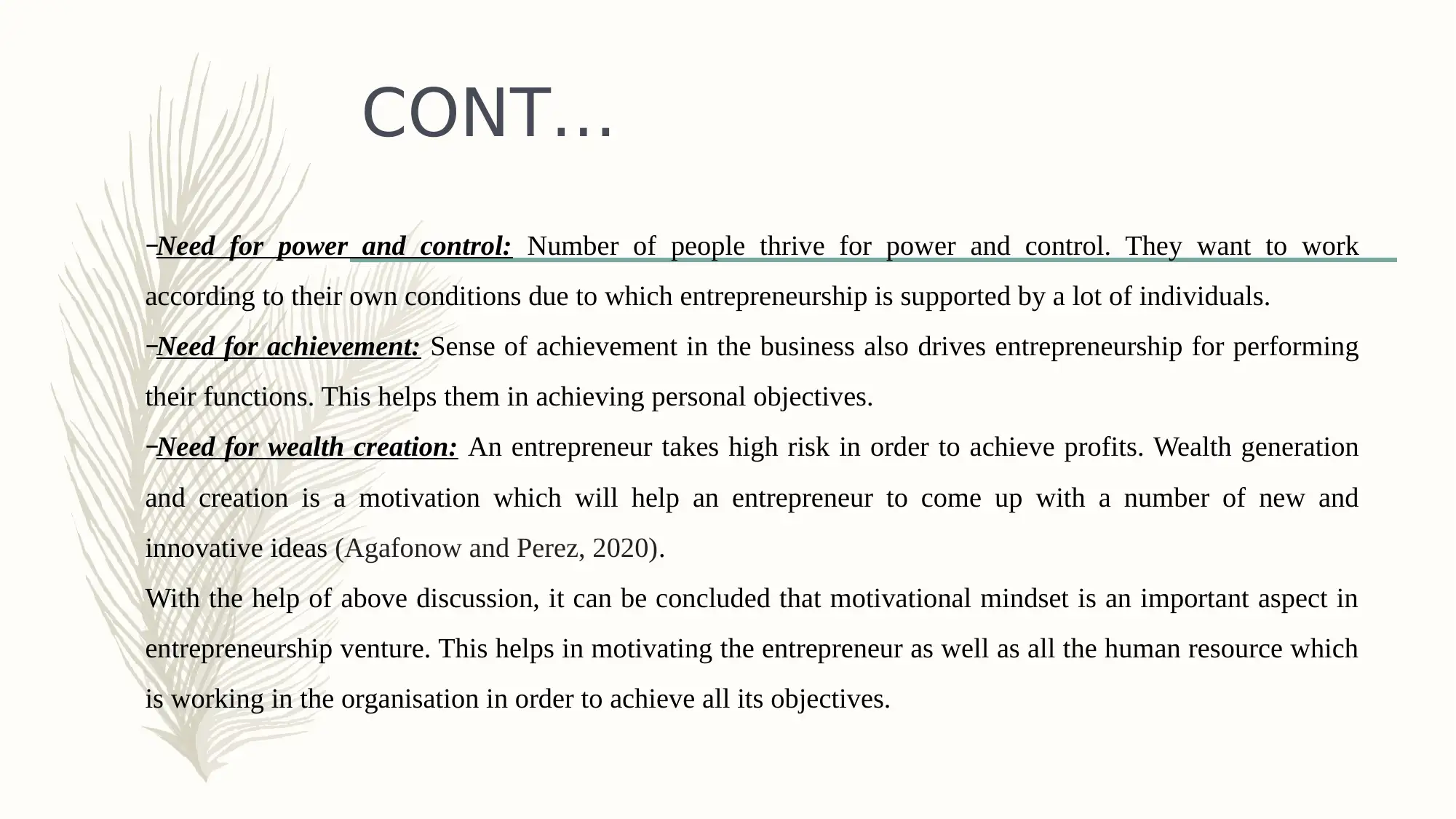
CONT…
–Need for power and control: Number of people thrive for power and control. They want to work
according to their own conditions due to which entrepreneurship is supported by a lot of individuals.
–Need for achievement: Sense of achievement in the business also drives entrepreneurship for performing
their functions. This helps them in achieving personal objectives.
–Need for wealth creation: An entrepreneur takes high risk in order to achieve profits. Wealth generation
and creation is a motivation which will help an entrepreneur to come up with a number of new and
innovative ideas (Agafonow and Perez, 2020).
With the help of above discussion, it can be concluded that motivational mindset is an important aspect in
entrepreneurship venture. This helps in motivating the entrepreneur as well as all the human resource which
is working in the organisation in order to achieve all its objectives.
–Need for power and control: Number of people thrive for power and control. They want to work
according to their own conditions due to which entrepreneurship is supported by a lot of individuals.
–Need for achievement: Sense of achievement in the business also drives entrepreneurship for performing
their functions. This helps them in achieving personal objectives.
–Need for wealth creation: An entrepreneur takes high risk in order to achieve profits. Wealth generation
and creation is a motivation which will help an entrepreneur to come up with a number of new and
innovative ideas (Agafonow and Perez, 2020).
With the help of above discussion, it can be concluded that motivational mindset is an important aspect in
entrepreneurship venture. This helps in motivating the entrepreneur as well as all the human resource which
is working in the organisation in order to achieve all its objectives.
Paraphrase This Document
Need a fresh take? Get an instant paraphrase of this document with our AI Paraphraser
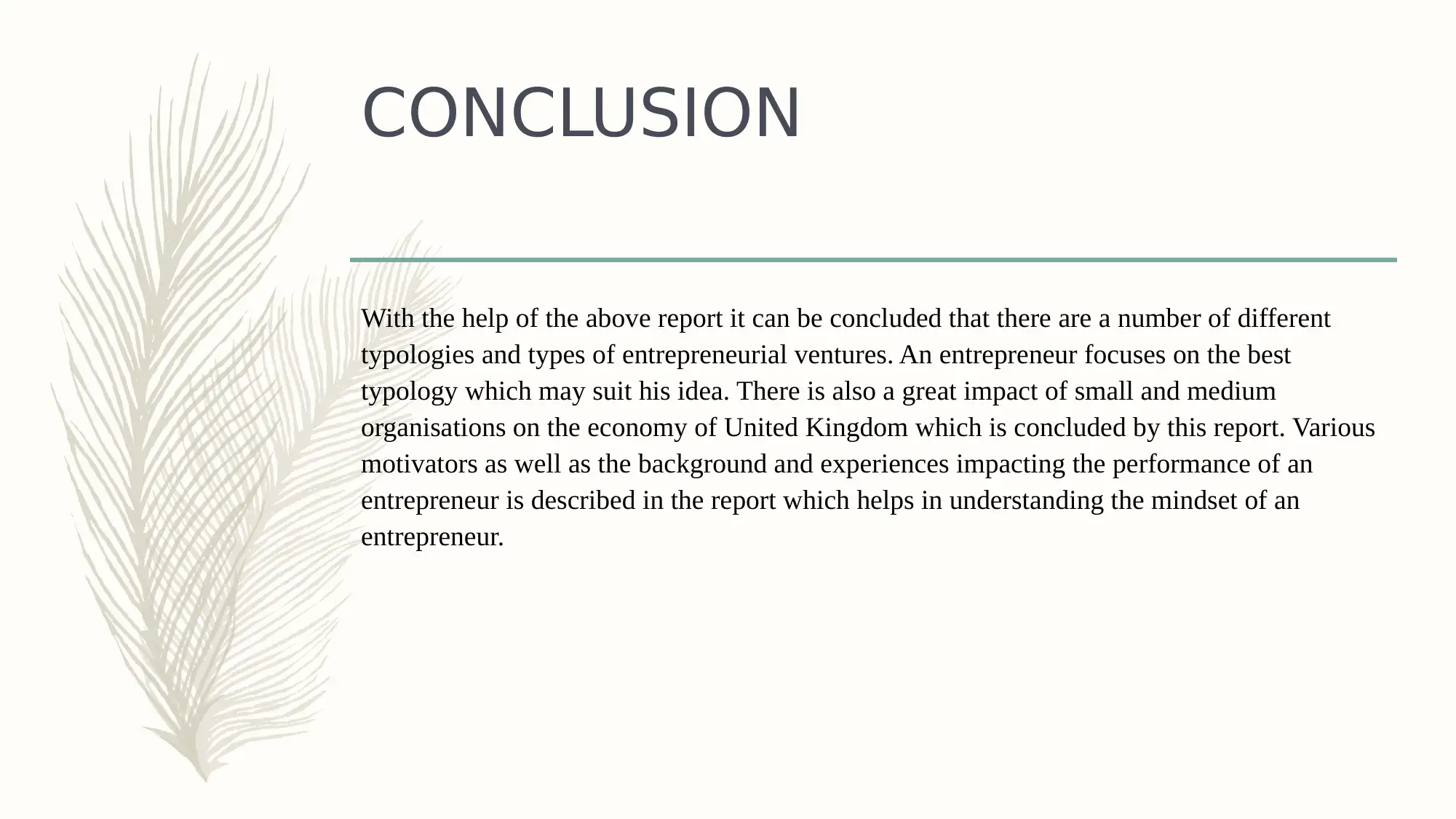
CONCLUSION
With the help of the above report it can be concluded that there are a number of different
typologies and types of entrepreneurial ventures. An entrepreneur focuses on the best
typology which may suit his idea. There is also a great impact of small and medium
organisations on the economy of United Kingdom which is concluded by this report. Various
motivators as well as the background and experiences impacting the performance of an
entrepreneur is described in the report which helps in understanding the mindset of an
entrepreneur.
With the help of the above report it can be concluded that there are a number of different
typologies and types of entrepreneurial ventures. An entrepreneur focuses on the best
typology which may suit his idea. There is also a great impact of small and medium
organisations on the economy of United Kingdom which is concluded by this report. Various
motivators as well as the background and experiences impacting the performance of an
entrepreneur is described in the report which helps in understanding the mindset of an
entrepreneur.
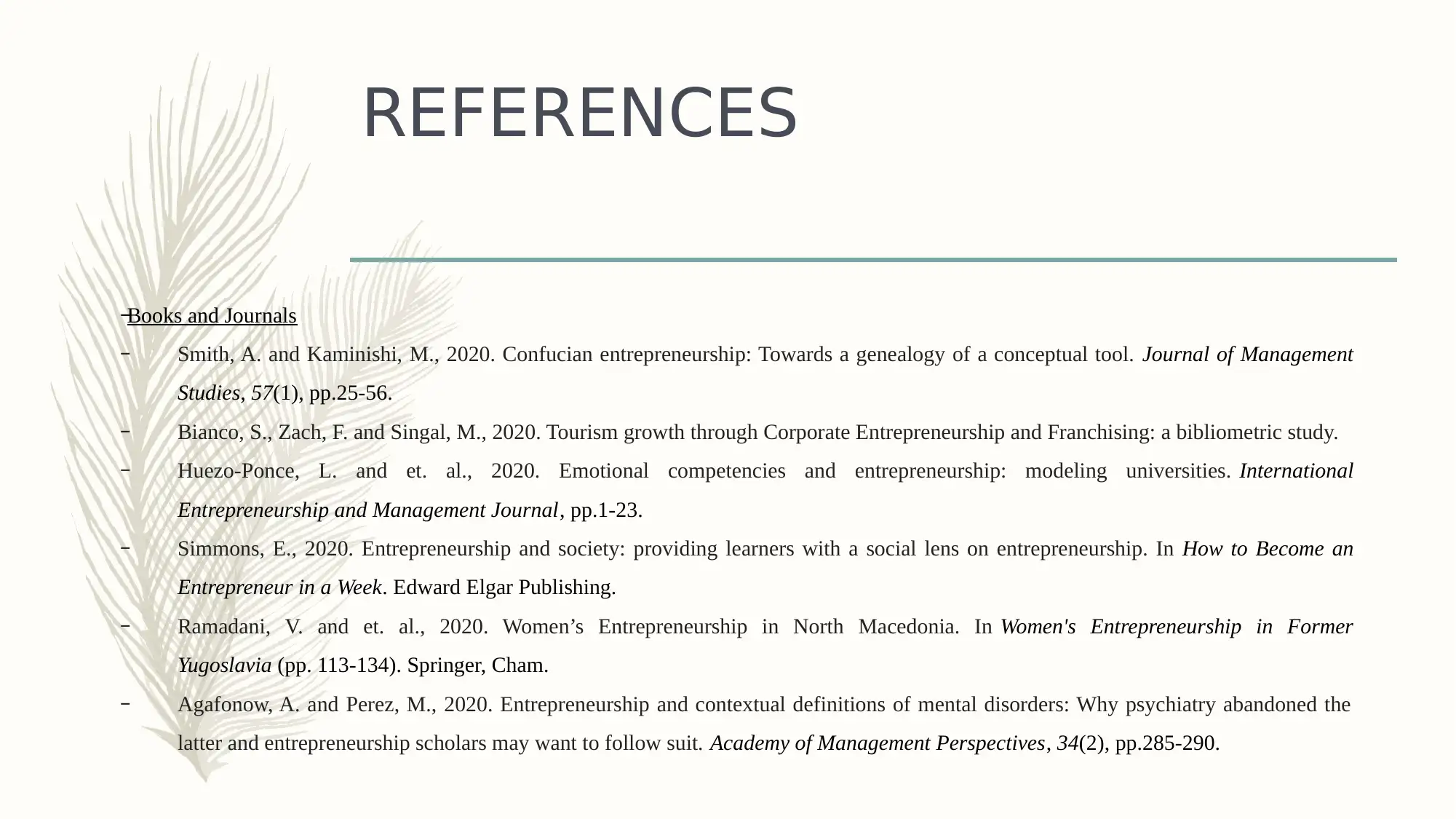
REFERENCES
–Books and Journals
– Smith, A. and Kaminishi, M., 2020. Confucian entrepreneurship: Towards a genealogy of a conceptual tool. Journal of Management
Studies, 57(1), pp.25-56.
– Bianco, S., Zach, F. and Singal, M., 2020. Tourism growth through Corporate Entrepreneurship and Franchising: a bibliometric study.
– Huezo-Ponce, L. and et. al., 2020. Emotional competencies and entrepreneurship: modeling universities. International
Entrepreneurship and Management Journal, pp.1-23.
– Simmons, E., 2020. Entrepreneurship and society: providing learners with a social lens on entrepreneurship. In How to Become an
Entrepreneur in a Week. Edward Elgar Publishing.
– Ramadani, V. and et. al., 2020. Women’s Entrepreneurship in North Macedonia. In Women's Entrepreneurship in Former
Yugoslavia (pp. 113-134). Springer, Cham.
– Agafonow, A. and Perez, M., 2020. Entrepreneurship and contextual definitions of mental disorders: Why psychiatry abandoned the
latter and entrepreneurship scholars may want to follow suit. Academy of Management Perspectives, 34(2), pp.285-290.
–Books and Journals
– Smith, A. and Kaminishi, M., 2020. Confucian entrepreneurship: Towards a genealogy of a conceptual tool. Journal of Management
Studies, 57(1), pp.25-56.
– Bianco, S., Zach, F. and Singal, M., 2020. Tourism growth through Corporate Entrepreneurship and Franchising: a bibliometric study.
– Huezo-Ponce, L. and et. al., 2020. Emotional competencies and entrepreneurship: modeling universities. International
Entrepreneurship and Management Journal, pp.1-23.
– Simmons, E., 2020. Entrepreneurship and society: providing learners with a social lens on entrepreneurship. In How to Become an
Entrepreneur in a Week. Edward Elgar Publishing.
– Ramadani, V. and et. al., 2020. Women’s Entrepreneurship in North Macedonia. In Women's Entrepreneurship in Former
Yugoslavia (pp. 113-134). Springer, Cham.
– Agafonow, A. and Perez, M., 2020. Entrepreneurship and contextual definitions of mental disorders: Why psychiatry abandoned the
latter and entrepreneurship scholars may want to follow suit. Academy of Management Perspectives, 34(2), pp.285-290.
⊘ This is a preview!⊘
Do you want full access?
Subscribe today to unlock all pages.

Trusted by 1+ million students worldwide
1 out of 9
Related Documents
Your All-in-One AI-Powered Toolkit for Academic Success.
+13062052269
info@desklib.com
Available 24*7 on WhatsApp / Email
![[object Object]](/_next/static/media/star-bottom.7253800d.svg)
Unlock your academic potential
Copyright © 2020–2026 A2Z Services. All Rights Reserved. Developed and managed by ZUCOL.




